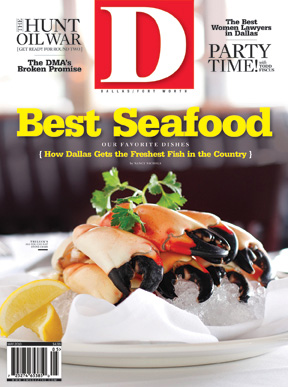One reason that Dallas has suffered less than other parts of the country during the recession is the sheer amount of fees generated by the internecine court battle, now three years old, being waged by members of the Hunt family. It seems nearly every other lawyer in town has been drawn into the fray. They are all paid well. The money trickles down. It’s a stimulus bill unto itself.
At issue—initially, at least—is $92 million that Al Hill III, H.L. Hunt’s first great-grandchild, claims he is owed by a family trust. His father, Al Hill Jr., calls the lawsuit a scheme hatched by a man unable to earn a living and desperate to keep his spendthrift wife clad in Escada. Until recently, the odds appeared to favor the father. But February brought a shocking turn of events: a federal judge found that Al Jr. had lied to the Court about a crucial detail concerning the family trust. And now it looks like Al Jr., in an effort to keep his son’s hands off $92 million he is rightfully owed, might end up costing the family quite a bit more, something on the order of half a billion dollars.
The story, for our purposes, began in 2003, when 58-year-old Al Jr., drinking wine late at night, pitched over the rail of a first-floor porch at his Lakeside Drive house. The fall left him paralyzed from the neck down, lying in his flower bed until a housekeeper found him in the morning. As a result, Al Jr. gave up drinking. His newfound sobriety brought him closer to his son, who’d also given up drinking under similar circumstances (in his sophomore year at Baylor, Al III drove a Toyota Supra into a house). In 2005, Al Jr. hired his 35-year-old son as his family representative and investing consultant, paying him $10,000 per week. He also disclaimed most of his interest in a trust established by H.L. Hunt for Al Jr.’s mother, Margaret Hunt Hill, irrevocably signing over hundreds of millions of dollars to his children.
The rancor started when Margaret died, in June 2007. Al III’s relationship with his father and the rest of the family soured as he began asking for an accounting of his grandmother’s trust, part of which he believed now belonged to him, since his father had signed that disclaimer. In fact, the son claimed in court filings—he has filed about a dozen lawsuits in at least nine different courts—that his father signed yet another irrevocable disclaimer of the trust in 2007.
Here an aside: the son originally employed as his primary counsel Bill Brewer, of the firm Bickel & Brewer, which is likely one reason that many in Dallas assumed the son had no legitimate claim. Brewer last year posed in a pin-striped suit, with the Dallas skyline behind him, for a Wall Street Journal story about his firm’s dedication to “old-school power attire.” The father, on the other hand, is represented by Mike Lynn, of the firm Lynn Tillotson Pinker & Cox. It’s fair to say that Lynn spends less time promoting his clothes.
So to those who’ve been following the father-son spat, the father’s recent stumbles in federal court are a real head-scratcher. Why would Lynn allow his client to lie to the Court—and not just lie but lie so clumsily?
Al Jr. told the Court that on March 22, 2005, when he signed the disclaimer and gave most of his mother’s trust to his children, he lacked the mental capacity to make the decision. He was medicated and still recovering from his fall. That much made sense, and Judge Reed O’Connor dismissed the son’s motion for summary judgment that would have given him his millions.
But then there was the matter of the two versions of the disclaimer, one of which the son claimed his father signed in 2007. In a sworn affidavit prepared by Lynn, the father said there wasn’t a 2007 disclaimer. He said that on March 22, 2005, he’d executed two disclaimers. The second disclaimer amended the first. There were four copies of it. And, owing to his impaired state, he’d missed the signature line on the fourth copy. That explained why it appeared as if there were two different documents, signed at different times, because a 40-year employee of the father’s, a woman named Joyce Waller, had signed the fourth copy of the disclaimer for him, while she was notarizing the documents. Waller stated this in an affidavit prepared by Lynn, and she testified to it later in court.
But the more Judge O’Connor looked at the two versions of the disclaimer, the less it looked like they were executed on the same day. Not only was Al Jr.’s signature in a different ink on the documents, but the heading was double spaced on the first document and single spaced on the second. Other signatures didn’t match up, either, including Waller’s. And her notary seals appeared to be different. Most significant, the second disclaimer omitted a single word, “general,” when it referred to a “power of appointment.” O’Connor hauled everyone into court for a hearing, and, under questioning, the full picture began to emerge.
H.L. Hunt had set up two identical trusts for his eldest children, one for his son Hassie and one for his daughter Margaret. Hassie’s trust also referred to “general powers of appointment,” and that one word—“general”—exposed his trust to a $500 million tax liability upon his death in 2005.
Days after Margaret’s death in 2007, O’Connor concluded, Al Jr. executed a new disclaimer of his mother’s trust, omitting the word “general” to dodge that same pesky $500 million tax liability. But executing a new disclaimer when everyone agreed Al Jr. had regained his mental capacity would mean that he’d have to give his son the $92 million. So he backdated the 2007 document to March 22, 2005, when he supposedly didn’t know what he was doing.
When pressed, Al Jr. changed his story, telling the judge, essentially: okay, yes, the disclaimer was updated in 2007, but the change was no big deal, and I didn’t really lie when I said I didn’t execute another version of the disclaimer because I never signed it, and it was never notarized. What happened was, we took the original signature page from the 2005 document and stapled it to the two new pages typed up in 2007.
Court documents don’t say, but presumably Al Jr. offered this defense with a straight face.
O’Connor found that Al Jr. lied in his affidavit (or, if you like, submitted it “in bad faith with the intent of misleading the Court”) and then lied again to cover up the first lie (his “testimony was intentionally false”). The judge ordered the father to pay his son’s lawyers’ fees, and he sent the pair to mediation to work it out, with a warning: the father’s “grave misconduct” could warrant future sanctions, including holding him in contempt and entering summary judgment in favor of the son—giving him the $92 million. What’s more, O’Connor raised the obvious question of whether the 2007 amended disclaimer is legally effective, meaning the trust might still have to pay the $500 million in taxes.
Of course, that 2007 document would have escaped scrutiny if the father had avoided the fight with his son in the first place. Now, though, there’s too much at stake to surrender.
Four days after Judge O’Connor issued his order, the father filed a claim against his son in another court. The lawsuit, authored by yet another attorney working for the father, Gregory Shamoun, accuses the son of committing corporate espionage against Hunt Petroleum, the main asset of Margaret’s trust, which was sold in 2008 to XTO Energy for $4.2 billion. In the filings, the father refers to his son as “The Apostate” and casts his wife, Erin Hill, as a social climber, making allusions along the way to the Bible; Deliverance; Absalom, Absalom!; and Gone With the Wind. The upshot: Al Jr. claims that his son’s misdeeds interfered with the sale of Hunt Petroleum, lowering the final bid for the company. He’s suing his son for the difference: $439 million.
Write to [email protected] .






